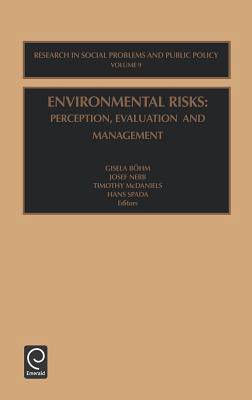
- Afhalen na 1 uur in een winkel met voorraad
- Gratis thuislevering in België vanaf € 30
- Ruim aanbod met 7 miljoen producten
- Afhalen na 1 uur in een winkel met voorraad
- Gratis thuislevering in België vanaf € 30
- Ruim aanbod met 7 miljoen producten
Zoeken
Environmental Risks
Perception, Evaluation and Management
€ 145,45
+ 290 punten
Omschrijving
Environmental risks are among the most serious challenges of today's societies. Virtually all environmental risks are anthropogenic. The consequences of past decisions made by individuals, business, and governments have already devastated many of the earth's ecological systems and there is an ongoing discussion about the potential effects of environmental change and whether the earth will still provide a livable environment for future generations. The past decade has seen a dramatic growth in publications that focus on environmental issues. However, this literature has been dominated by the natural sciences and research focuses on obtaining more accurate information about natural and ecological processes, with the tacit assumption that this information will prove useful to improve individual, organizational, and societal decision making. This volume focuses on the psychological, sociological, and cultural aspects of environmental risks that have not been given adequate and integrated attention in the past. Understanding of the psychological, social, cultural, and political forces will determine the successes and failures of environmental risk management. In particular, public policy could be improved by the integration of more accurate assumptions about people's cognitions, attitudes, and emotions towards environmental risks.
Specificaties
Betrokkenen
- Uitgeverij:
Inhoud
- Aantal bladzijden:
- 320
- Taal:
- Engels
- Reeks:
- Reeksnummer:
- nr. 9
Eigenschappen
- Productcode (EAN):
- 9780762308064
- Verschijningsdatum:
- 22/11/2001
- Uitvoering:
- Hardcover
- Formaat:
- Genaaid
- Afmetingen:
- 156 mm x 234 mm
- Gewicht:
- 625 g

Alleen bij Standaard Boekhandel
+ 290 punten op je klantenkaart van Standaard Boekhandel
Beoordelingen
We publiceren alleen reviews die voldoen aan de voorwaarden voor reviews. Bekijk onze voorwaarden voor reviews.










